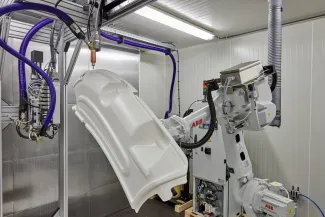Smart adhesive bonding leads to more recycling and reuse
Screws and bolts or soldering? In the automotive industry, mechanical engineering, and construction sector, adhesives are gaining popularity. In fact, adhesives have become essential in assembly due to their efficient bonding of various materials and components. However, a major downside is that traditional adhesive bonds are irreversible, complicating repairs and high-quality recycling. Fortunately, a project called Circular Bonding is paving the way to a solution.

Bonding materials offers great benefits: it's lightweight, reduces noise, and improves the air and watertightness of products. However, when it comes to repair and recycling, bonded parts can be problematic since they're nearly impossible to separate once joined.

The Circular Bonding project is tackling this challenge. Knowledge centers Flanders Make and VITO, together with the Belgian Institute for Welding Technology (BIL), are addressing the growing demand from businesses for help in designing detachable multi-material connections. An adhesive process that allows for bonding and debonding on command could significantly enhance the manufacturing, maintenance, and recyclability of various products.
The Circular Bonding project helps companies choose the right reversible bonding techniques and production processes. It also offers insights into the potential for circularity and the possibilities for adopting circular business models. The project has created various demonstrators to prove the feasibility of reversible bonding technology, showcasing benefits like reduced production waste, the potential for reusing components after their lifespan, and efficient recycling of products at the end of their life. The project targets the automotive, appliance, and construction industries.



